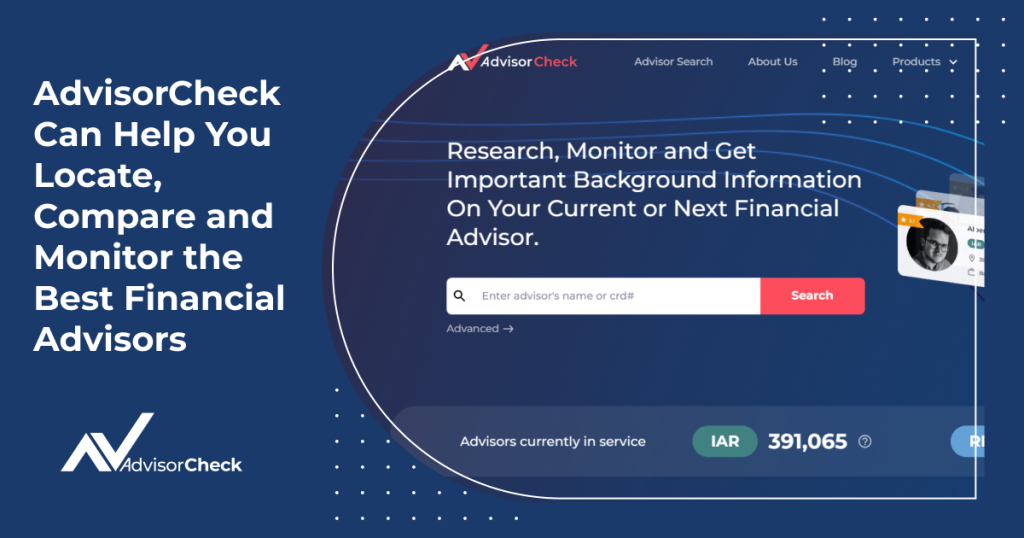
Financial Advisor
What Are the Most Important Things to Look Out for and Research When You Are Deciding Which Financial Advisor to Work With?
We are in the spotlight












Are you planning on hiring a financial advisor in the near future? Perhaps you’re early on in the process and have done some initial investigation, or maybe you’ve gotten far enough in your search that you already have a list of prospective financial advisors that you’re now deciding between. Or maybe reading this article is your very first foray into research on how to make the best possible choice when you’re pondering this crucial decision. Either way, you need to know exactly what to look out for when making this decision, because it’s a choice that can have a huge impact on your financial future. To help empower you with the knowledge needed to make the right choice, we’ll explain what research shows are the most common reasons that people stop working with advisors, and what this reveals about what exactly to look out for. We’ll also describe what experts say are the main characteristics of an ideal financial advisor. Eager to begin doing your research? Check out AdvisorCheck – the platform distills a wealth of information into a clear and digestible format so you can easily compare financial advisors and hire the right professional for your needs. Claim your free AdvisorCheck membership to get started. Before you make a final decision regarding which financial advisor to work with, one question to ask yourself is why you’re hoping to hire an advisor. Having a clear understanding of your goals – and being able to list and explain those goals to prospective advisors – is likely to make that relationship significantly more productive. Still unsure exactly why you might want to work with an advisor? One of our studies conducted on those who had previous experience with financial advisors found that the most common reason for hiring a financial advisor was in order to solicit investment advice, while the second most common reason was to gain retirement advice. But survey participants also gave a variety of other reasons for hiring an advisor: Do any of these reasons ring true for you? If not, here are some other reasons that you might need to hire a financial advisor: If any of these reasons apply to your situation, take note of them and keep them at the front of your mind when deciding to work with an advisor. After all, while many advisors are generalists who can effectively guide you through a wide range of financial situations, it’s also true that lots of advisors will have different specializations – you may want to choose an advisor whose topic(s) of focus are in line with your main goals. For instance, some advisors will be more focused on the stock market and providing investment advice, while others will have a greater depth of knowledge in the area of taxes. Other potential specializations for financial advisors include retirement, education, insurance, and real estate. Learn more about the different types of financial advisors from IARs to RRs, CFPs and more, along with what they mean. One way of understanding what the most important things to look out for are when you’re choosing a financial advisor is by looking at the reasons that most people cite when they decide to stop working with advisors. These real-world reasons highlight potential red flags to be aware of before you make a final hiring decision. Our survey of investors who made this choice found that the majority of those who left their financial advisor felt that the service was simply not worth paying for. After this, the second most common reason for leaving advisors was a lack of transparency surrounding their advisors’ fees. Less commonly cited motivations for this decision were poor performance, conflicts of interest on the part of the advisor, and limited availability of products and services. Communication issues with the advisor were only rarely a factor in the choice to stop working with advisors. Finally, although making sure that whichever advisor you hire has the right qualifications for the job is undeniably important, among those surveyed a lack of qualifications was never cited as a motivating factor in leaving their advisors. This makes sense when you consider that it’s pretty easy to make sure an advisor has the qualifications that they claim to have with just a bit of background research. Looking them up on AdvisorCheck is one way to check an advisor’s credentials – ensuring that the advisor you hire has the right training and passed the right tests to be able to effectively manage your money and guide you toward short- and long-term financial stability and prosperity. “This survey is quite enlightening not only for us, but for any investor who is working with or is thinking of working with a financial advisor,” says Leonard Kim of AdvisorCheck. “Understanding the woes that other investors face opens up the opportunity of exactly what to look for to start a healthy relationship from the very start,” Leonard continued. Making the right decision about which financial advisor to work with is an essential choice for your financial future. We’ll explain why people stop working with advisors, what this reveals about which factors to prioritize in your decision, and the features that make an ideal advisor according to industry experts.
First, Establish Why You’re Planning to Work with a Financial Advisor

Why Do People Stop Working with Their Financial Advisors?

We all need help getting our finances in order throughout our lifetime.
Look through our database to find the most trustworthy financial advisors in your area.
So: what can you take away from others’ experiences in this case, to make sure you don’t waste your time and money and end up having to stop working with your financial advisor, as those that AIMR Analytics surveyed decided to do? Here are some questions to ask yourself before you hire someone, and our explanations of why exactly these questions are so important: First, it’s clear that it’s absolutely crucial to choose a financial advisor who can withstand a basic cost-benefit analysis – that is, are their services worth more to you and more beneficial to your finances than they cost? (Another way of phrasing this question: would you be “making a profit” by working with them?) The answer is going to be a definite “no” if you hire someone whose fees cost way more money than they could ever help you make with their advice. This will, of course, depend quite a bit on your income as well as your overall wealth. Some advisors charge high fees and even have minimum asset thresholds to ensure they only work with wealthier clients, while other advisors are happy to work with clients across a wider range of incomes/wealth levels, but their fees might not be worth it for you to work with unless you earn more than a certain amount. Second, you want to select a financial advisor who is transparent in how they get paid. If it’s unclear why you’re paying them the amount you are, it’s easy to get frustrated and feel like you’re being taken advantage of. Trust is an incredibly important component of an effective and beneficial relationship with your advisor – without it, you might as well be throwing your money away! So, before you go ahead and hire a financial advisor, make sure that you have clearly established exactly how they get paid. Most financial advisors are paid in three different ways. The first is by commission, when they sell you a product (e.g, an annuity) and earn a percentage of that sale. The second is by the hour, or by a particular project. And the third way that advisors are most often paid is with advisory fees, which Kyle Walters (author of The Personal CFO and Founder of Atlas Wealth Advisors) described to Forbes as “best for long-term, comprehensive financial planning relationships” – probably what you’re looking to establish if you’re reading this article. The reason the advisory fee structure is usually best is that it provides you with access to your advisor whenever you need their advice: “As you build a long-term relationship with your advisor, you don’t have to worry about being charged for each phone call, question or project.” As a bonus, whether or not an advisor is willing to directly and honestly answer your questions about how they get paid is a great litmus test for whether or not they’re trustworthy overall. On this topic, Kyle Walters adds: “A great financial advisor won’t dodge your questions about fees. They should be transparent about where all of your money is going and why. This kind of clarity and trust is what allows you to save time, energy and money from handling your investments on your own.” Meanwhile, conflicts of interest on the part of an advisor are a major red flag to look out for. They can lead professionals to give advice that doesn’t prioritize their clients’ interests and financial needs. One of the ways to minimize the risk of this situation arising is to hire an advisor who is classified as a fiduciary, such as an investment advisor representative (more on this and other types of financial advisors here). Being a fiduciary means that a financial advisor is going to be held to the highest standard of conduct, which has two main components, according to Commonwealth’s Vice President of Compliance Cynthia Jeffries: Although hiring an advisor who is a fiduciary doesn’t 100% ensure that they won’t have any conflicts of interest, it makes it a lot less likely, because fiduciary responsibility was explicitly enshrined in the Investment Advisers Act of 1940 to protect clients from deception and/or exploitation. Now that we’ve established what questions you need to ask yourself when you’re deciding which financial advisor to work with, let’s talk about what an ideal advisor is like to give an idea of what you should be seeking out. According to our in-depth interviews of financial experts with more than a decade of experience in the financial management industry, an ideal financial advisor displays the following traits: When you’re deciding between different financial advisors, look for these important features above all else. This is how you establish an advisor relationship that will last for years to come, providing a consistent anchor of stability and guidance as you weather ups and downs in your personal and professional life, in the market, and in the economy as a whole.Main Takeaways from the Reasons People Leave Their Financial Advisors

Will This Advisor Be Worth the Cost?
Are This Advisor’s Fees Clear and Do They Make Sense to Me?
Does This Advisor Have Any Conflicts of Interest?
What Makes an Ideal Financial Advisor?

Few people are aware that financial advisors help you with more than investments, but help you find HUGE tax breaks that could help you achieve your financial goals at a MUCH quicker rate.
Use AdvisorCheck to find the best financial advisors near you.
Wherever you are in the process of hiring a financial advisor, AdvisorCheck is going to be a useful tool that you’ll want to rely on. It’s not only helpful for locating top financial advisors near you, but also for comparing advisors once you’ve made a list of prospective hires – all completely free of charge. AdvisorCheck gathers the most reliable and rigorous sources of information to help you wade through their database of more than one million investment advisor representatives (IARs) and registered representatives (RRs). Begin at the AdvisorCheck advisor search page and input your location to bring up a list of potential hires in your area. You can make a free AdvisorCheck account to add advisors’ pages to your Saved Listings. You can also Compare as many as three advisor profiles at once by clicking on the scales symbol, which can be found at the bottom of every profile. Accessible via the left-hand sidebar, the AdvisorCheck Compare tool allows you to set three advisors side by side and weigh up their pros and cons based on: This detailed information is going to be a serious asset as you assess whether or not each prospective advisor meets the criteria we’ve described above, and whether any of them have red flags indicating that you should avoid working with them. AdvisorCheck’s Comparison tool makes an array of essential info digestible, to cut 80 percent or more off the hours you would have spent looking into various advisors. Even more helpful is the fact that once you’ve gone ahead and hired a particular advisor, it’s simple to track any changes that might be added to their profile over time when you’re using AdvisorCheck. Simply save your advisor’s profile to your AdvisorCheck account to be notified when new disclosures – or any other changes – are added. This makes it easy to monitor the person you’ve entrusted with the crucial role of managing your money, leaving you with fewer financial worries on your plate overall. There’s no better way to make sure you’ve selected the best possible financial advisor – someone who will prioritize your interests, build a close relationship with you over decades, and maintain abundant and up-to-date technical knowledge as well as years of experience – than by seeking out the highest quality, most in-depth information before you make a final decision. AdvisorCheck allows you to do just that, and select a professional who will be a catalyst to achieving your short- and long-term goals, both in your finances and in your life as a whole. Click here to make a free AdvisorCheck membership and begin evaluating and comparing financial advisors today. Written by Billy Quirk Fact checked by KJ Kim Reviewed by Dan HattoriAdvisorCheck Can Help You Locate, Compare and Monitor the Best Financial Advisors

Your go-to source for:
- Breaking out from living paycheck to paycheck
- Countering inflation with saving hacks
- Saving for your or your kid’s futures
- Turning home ownership from a dream into a reality
Disclosure The information provided in this article was written by the research and analysis team at AdvisorCheck.com to help all consumers in their financial journeys, by providing the resources and the insights to help improve one’s financial health, make it through recessionary and inflationary periods of time, and save their earnings to use them towards building a secure financial future. Unauthorized reproduction or use of this material is strictly prohibited without prior approval. Any parties interested in content syndication, references, interviews, or PR, please contact our marketing team at marketing@aimranalytics.com AdvisorCheck.com is an independent data and analytics company founded on the principles of helping to provide transparency, simplicity, and conflict-free information to all consumers. As an independent company providing conflict-free information, Advisorcheck.com does not participate, engage with, or receive funding from any affiliate marketing programs or services. To become a free AdvisorCheck member, visit advisorcheck.com/signup
Most read
The content of video and blog articles are for informational and entertainment purposes only and do not constitute investment, tax, legal, or financial advice. Always consult with a qualified professional before making any financial decisions. The views expressed are those of the author and do not reflect the opinions or recommendations of any affiliated entities.